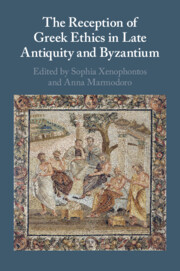Book contents
- The Reception of Greek Ethics in Late Antiquity and Byzantium
- The Reception of Greek Ethics in Late Antiquity and Byzantium
- Copyright page
- Contents
- Tables
- Contributors
- Acknowledgements
- Abbreviations
- Introduction
- Part I Ethics across the Late-antique and Byzantine Period
- Part II Prominent Ethical Views of the Time
- Chapter 9 The Ethos of a Theologian
- Chapter 10 Porphyry on Justice towards Animals
- Chapter 11 Eustratius of Nicaea and the Nicomachean Ethics in Twelfth-century Constantinople: Literary Criticism, Patronage and the Construction of the Byzantine Commentary Tradition
- Chapter 12 Michael of Ephesus on the Relation of Civic Happiness to Happiness in Contemplation
- Chapter 13 George Pachymeres’ Commentary on Aristotle’s Nicomachean Ethics
- Bibliography
- Index Locorum
- Index of Names and Subjects
Chapter 11 - Eustratius of Nicaea and the Nicomachean Ethics in Twelfth-century Constantinople: Literary Criticism, Patronage and the Construction of the Byzantine Commentary Tradition
from Part II - Prominent Ethical Views of the Time
Published online by Cambridge University Press: 15 June 2021
- The Reception of Greek Ethics in Late Antiquity and Byzantium
- The Reception of Greek Ethics in Late Antiquity and Byzantium
- Copyright page
- Contents
- Tables
- Contributors
- Acknowledgements
- Abbreviations
- Introduction
- Part I Ethics across the Late-antique and Byzantine Period
- Part II Prominent Ethical Views of the Time
- Chapter 9 The Ethos of a Theologian
- Chapter 10 Porphyry on Justice towards Animals
- Chapter 11 Eustratius of Nicaea and the Nicomachean Ethics in Twelfth-century Constantinople: Literary Criticism, Patronage and the Construction of the Byzantine Commentary Tradition
- Chapter 12 Michael of Ephesus on the Relation of Civic Happiness to Happiness in Contemplation
- Chapter 13 George Pachymeres’ Commentary on Aristotle’s Nicomachean Ethics
- Bibliography
- Index Locorum
- Index of Names and Subjects
Summary
This chapter examines the extent to which Eustratius of Nicaea is indebted to the ancient commentary tradition and at the same time how he departed from the earlier model in order to answer contemporary questions about meaning, some of which had a bearing on morality and ethics. In doing so, the chapter considers in detail Eustratius’ hermeneutics and textual approach, its dependence upon the ancient model and the novelties in his approach to Aristotle’s Nicomachean Ethics. It argues that Eustratius contributed fundamentally to the formation of a specifically Byzantine commentary tradition by sometimes criticising Aristotle or introducing some motifs that were unrelated to Aristotle’s moral philosophy. Finally, this chapter also investigates the historical circumstances of Eustratius’ career as a commentator and highlights how Eustratius’ literary and philosophical production reflects his patron Anna Comnena as a learned woman who devoted the second part of her life to moral philosophy.
Keywords
- Type
- Chapter
- Information
- The Reception of Greek Ethics in Late Antiquity and Byzantium , pp. 193 - 211Publisher: Cambridge University PressPrint publication year: 2021

